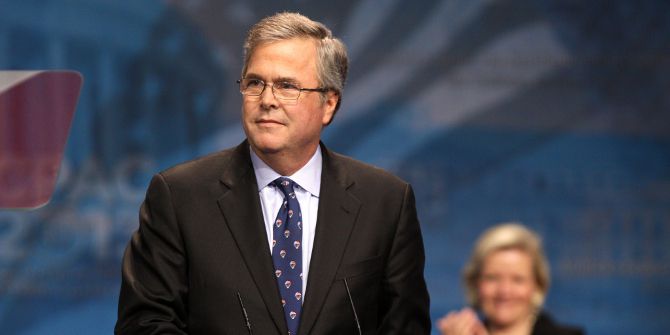USAPP Managing Editor, Chris Gilson looks at the best in political blogging from around the Beltway. Our round-up of state blogs will follow on Saturday afternoon.
President Obama, the Democratic Party, and the GOP
This week Republicans in Congress appeared to be edging closer towards defunding Planned Parenthood, a measure that most would expect President Obama to veto. The White House Dossier comments that the White House Press Secretary, Josh Earnest declined to confirm that the president would veto any such measure; something that they say is ‘weird’.
How will history view President Obama? The Mischiefs of Faction suggest that it is too early to begin assessments of the president’s legacy, despite some recent attempts to characterize him as one of the most consequential presidents in American history, as many of his accomplishments – even Obamacare – are not deeply entrenched.

President Obama visited Kenya this week and surprised many by stating that if he were to run for the office again (which he cannot do under the 22nd Amendment), then he thinks he could win. The Fix assesses Obama’s claim, but conclude that at this stage of the election cycle, it is just too hard to tell.
Moving on to the Democratic Party more generally, The Atlantic wonders if the party is abandoning its founding fathers, presidents Thomas Jefferson and Andrew Jackson., after the slave owning presidents’ names were dropped from fundraising dinners in Missouri and Connecticut. FiveThirtyEight meanwhile writes that the urban resurgence, which has seen cities growing at the same rate as their suburbs for the first time since World War II, is a double-edged sword for the party. They say while the party has benefited from huge voting margins in urban centres which have led to success in presidential elections, this has come at the expense of congressional and state legislative races, with a smaller proportion of Democrats now living in rural and suburban areas.
Turning to the Republican Party, The Federalist suggests that the reason why many Republicans dislike their own party, as has been shown in recent opinion surveys, is that if the party is incapable of defunding Planned Parenthood and stopping the recent Iran deal, making it seem to be of limited usefulness.
Elections and the road to 2016
Despite there being many, many months to go before the 2016 election, the media are already seizing on presidential polls, using the results to fuel their own speculation. The Monkey Cage urges us not to take polling this far out seriously, arguing that previous presidential elections have shown that polling at this point is not correlated with next November’s outcomes.
Concentrating on the GOP’s presidential race, Political Animal writes on Sunday that given the candidates’ recent extreme rhetoric, the Republican Party is not choosing a president, but a rebel leader. On Wednesday, The Fix looks at why the GOP’s presidential campaigns will buy far more TV ads than Facebook ones – because older people are more likely to vote than younger people. Next week sees the first Fox News debate between the top ten Republican candidates. Outside the Beltway says that ahead of the debate, in which participation is determined by polling numbers, there has been a great deal of clamoring for the tenth and final sport. What if a Republican wins next year? The Mischiefs of Faction tries to read the runes and imagine what a Republican might do in the Oval Office – from health care reform to addressing income inequality. Moving on to the GOP’s candidates, and beginning with Donald Trump who remained in the headlines this week:
- PoliticusUSA comments that the GOP is ‘screwed’ after Trump’s polling numbers shot up after his attack last week on Senator John McCain.
- The Fix tries to understand Donald Trumps’ appeal…
- … while Ten Miles Square reckons that Trump ‘tickles the hatred zone’ of voters, especially towards immigrants.
- The Federalist gives four reasons why the Republican Party needs Trump…
- …and it turns out that Trump would ‘love’ for 2008 Vice-Presidential nominee, Sarah Palin to be in his administration (FreakOutNation).

This week GOP candidates other than Donald Trump were naturally in the news as well:
- New Jersey Governor, Chris Christie, has a conundrum over timing (Roll Call’s Rothenblog)…
- …though not over marijuana, as he said this week that if elected president he will enforce the federal prohibition of the drug in states which have legalized it such as Colorado (Outside the Beltway).
- Former Arkansas Governor had a good morning on Monday this week – he was attacked by President Obama over his comments that the Iran deal would “take the Israelis and march them to the door of the oven” (The Fix).
- Current Wisconsin Governor, Scott Walker refused to confront Donald Trump this week over the latter’s criticisms of Walker’s job performance in Wisconsin – Crooks & Liars wonders how Walker might deal with threats like ISIS if he’s not willing to fight another presidential candidate.
- As of Thursday, the former Governor of Virginia, Jim Gilmore is running for the GOP nomination. That makes 17 now (Outside the Beltway).
The Democratic Party’s 2016 field is certainly much smaller than that of the GOP, but it was still in the headlines this week as well:
- The Fix says that former Senator and Secretary of State, Hillary Clinton’s numbers are down in the states that matter – Iowa and New Hampshire.
- Later, they look at six issues where will still don’t know where Clinton stands, such as on the Keystone XL pipeline.
- The New York Times botched a story about Clinton’s emails, reporting a nonexistent criminal investigation (The Atlantic).
- Not only is Vermont Senator Bernie Sanders electable (though not for the usual reasons) (Americablog)…
- … he had an enormous virtual party with 100,000 supporters this week too (Informed Comment).
Government, the Beltway and Congress’ agenda
On Wednesday, The Fix comments that a new Pew survey has found that the Supreme Court is disliked more than ever before, mostly by Republicans. They say that people now view the Supreme Court in partisan terms – which is a horrible thing for democracy.
Turning to the legislature, The Daily Signal reckons that Congress could face a government shutdown later this year, as when lawmakers return from the summer recess in September, the row over funding for Planned Parenthood, along with priorities such as transport funding and the debt ceiling, could lead to an impasse.
The House saw a very unusual attempt to unseat the Speaker this week, with Representative Mark Meadows of North Carolina filing a motion to ‘vacate the chair’ of Speaker John Boehner. The Fix says that while Boehner’s leadership is facing an increasingly unruly caucus, the current challenge has no chance of success.
Heading over to the Senate, The Lonely Conservative reports on Sunday that the chamber’s Republicans have voted to bring back the suspended Export-Import Bank. They say that Majority Leader, Mitch McConnel (R-KY) kept his promise to the Democratic Party to allow a vote on extending the bank in exchange for their support on the TPP trade deal.

It was Senator Ted Cruz (R-TX) vs. the Senate this week, at least according to Ten Miles Square. They say that the Senator was rewarded for calling McConnell a liar last week with a rebuke from almost the entire Senate after Cruz sought recognition to force a roll call vote. The Brennan Centre for Justice meanwhile writes that this week the Senate actually managed to consider, adopt and reject more than 50 amendments to education-related legislation but that it was also mired in threats of a filibuster from both sides as well.
On Thursday, Roll Call’s #WGBD comments that the Senate’s vote on a six-year highway bill may be its last accomplishment before the August recess, despite having another session scheduled for next week.
Foreign policy, defense and trade
On Saturday, The Hill’s Congress blog looks at what proposals for a federal financial control board would mean for the embattled territory. They say that despite lobbying by members of Congress, the majority of those on the island oppose it, as they feel that they can fix their fiscal crisis if they are given the right tools, such as the ability to declare Chapter 9 federal bankruptcy.
The Daily Signal comments on Sunday that under President Obama US military strength has significantly decreased; the Army has 10 percent less manpower, and the Air Force is the smallest and oldest force of combat aircraft in its history. According to RedState, the latest move to update the Air Force’s equipment, the F-35 jet, is a mess – so much so that the entire project may need to be grounded.
The American Interest writes this week that the US needs to invest in a Europe Strategy after years of neglect of transatlantic relationships. They say that given Europe’s problems, US engagement remains vital to mutual security.
The Fix says that little more than two weeks after it was struck, support for the Iran deal appears to be falling, with a new poll showing that 52 percent of Americans feel that Congress should reject the deal.
Obamacare and health policy

This week marks the 50th anniversary of Medicare and Medicaid, created as part of President Lyndon Johnson’s Great Society program. The Daily Signal writes that after five decades, both programs suffer from problems inherent to how they are organized such as limited choice and a high degree of waste and fraud, and argue that it is time for change. The American Prospect on the other hand looks at why we need Medicaid, despite its stigma as ‘welfare medicine’.
Turning to a more recent healthcare program – The Affordable Care Act (or ‘Obamacare’), The Daily Signal says that about 7.5 million Americans paid an average penalty of $200 for not having health insurance under the law in 2014. Roll Call’s POTUSOperandi, meanwhile writes that the GOP’s attempt to repeal Obamacare via special budget rules while President Obama remains in office is doomed, as Obama will simply veto the measure, and that there are not enough votes in Congress to override this.
On Tuesday, Wonkblog says that by 2024, health spending will be nearly 1/5th of the economy according to a new projection – mostly due to an aging population and the increasing take-up of health insurance coverage under Obamacare.
The economy and society
On Sunday, The American Prospect looks at why some very Republican states, such as Nebraska and Idaho are reconsidering the death penalty- mostly because of its costs and inefficiency. Staying on the subject of Red States, The American Interest says that they are receiving the most immigration – stealing talented young workers and innovative businesses from blue states by offering more favorable tax and regulatory environments.
On Monday one of Donald Trump’s advisors stated in an interview that a man cannot legally rape his wife. Wonkblog says that while the statement is not remotely true, nearly half of states make it harder for a wife to accuse her husband or rape compared to single women.
This week National Journal looks at how anti-discrimination laws are coming into conflict with other laws which are designed to allow discrimination on religious grounds, especially in the wake of the Supreme Court’s marriage equality decision at the end of June.
Why is it never ‘the right time’ to discuss gun control? Because we have averaged one mass shooting every day since the start of the year, says Wonkblog.
Is ‘white flight’ now a thing of the past? Not really, writes The Atlantic, citing a new study which shows that segregation between places is increasing, despite that cities as a whole are becoming more diverse.
And finally…
Wonkblog has an interesting chart showing how much of your life you’ve spent binge-watching TV.
The New Yorker looks at photos of the then Vice-President Dick Cheney on 9/11.
Do you have Trump déjà vu? No wonder – this is not his first attempt at the presidency.
Featured image: House Speaker John Boehner Credit: Gage Skidmore (CC-BY -SA-2.0)
Please read our comments policy before commenting.
Note: This article gives the views of the author, and not the position of USAPP– American Politics and Policy, nor of the London School of Economics.
Shortened URL for this post: http://bit.ly/1IuxHMY






